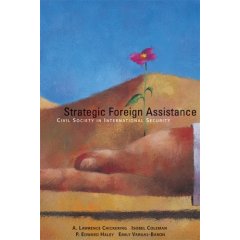
Strategic Foreign Assistance: Civil Society in International Security by A. Lawrence Chickering, Isobel Coleman, P. Edward Haley, and Emily Vargas-Baron, 2006.
One of the Directors of Americans for UNESCO and my long time colleague and friend, Emily Vargas-Baron, is one of the coauthors of this important new book on foreign policy.
Book Description:
Stopping terrorism at its source The emergence of global terrorism has created a new reality in national and international security. Governments and peoples must come together to encourage economic, political, legal, and social change within weak societies in which terrorists take refuge and to assist deadlocked governments in overcoming the explosive legacies of religious and ethnic conflict. In Strategic Foreign Assistance the authors show that, to do this, the United States must develop a strategic international cooperation and assistance policy that fosters strong civil societies. The book details the key role that civil society organizations (CSOs) could play in mitigating the conditions that promote terrorists and terrorism. The authors reveal how CSOs can help nations overcome internal conflicts by attacking the roots of violence and empowering people directly affected by the conflict to develop culturally appropriate strategies to pacify violent regions. They explain the value of informal society-based, nonstate initiatives--including initiatives aimed at religious leaders--in recruiting a country's citizens in the efforts for peace. And they show how CSOs can help accomplish strategic objectives for promoting social development and changing state policies in such critical areas as economic and educational policy reform, empowerment of women, property rights for the poor, and other vital areas. A. Lawrence Chickering is a research fellow at the Hoover Institution. Isobel Coleman is a senior fellow in U.S. foreign policy and director of the Women and U.S. Foreign Policy Program of the Council on Foreign Relations. P. Edward Haley is the Wm. M. Keck Professor of International Strategic Studies at Claremont-McKenna College. Emily Vargas-Baron directs the Institute for Reconstruction and International Security through Education. "This is a profound and greatly useful exposition on a critical question yet strangely unexamined: how to use civil society to advance strategic objectives abroad, especially when government-to-government relations are incapable of moving adversaries away from conflict. The approach is useful and challenging and original, at once profoundly conservative and yet bound to be deeply appealing without regard to party to the most perceptive of those responsible for American foreign policy."Emily tells me that you can buy this book at a discount at Amazon.
JAD
No comments:
Post a Comment